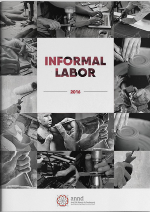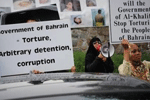Bahrain
|
Bahrain: Catastrophic impact of Covid-19
Bahrain has been severely affected by the Covid-19 pandemic, both in terms of the number of people affected (with over 16 thousand cases per million inhabitants at the end of June 2020) and because of the grave plunge of oil prices that has resulted in a major drop in government revenues.
The Parallel Report on Bahrain Implementation of the 2030 Agenda of Sustainable Development and Sustainable Development Goals by Bahrain Transparency Society (BTS) covers SDGs 3 (on health), 6 (water and sanitation), 8 (decent work), 13 (climate change) and 16 (governance). It pays particular attention to those ·left behind” both among Bahrainis as well as among migrants and expatriates, that are over half of the population of the islands. It concludes that “the catastrophic impact of the double crises of COVID19 and oil slump, re-asserted the need for radical review of the development model”.
|
Published on Fri, 2017-05-12 15:43
“Informal labor is not a marginal issue in Arab countries. It is a core component of modern Arab economies and the distribution of work therein and is doomed to expand under current policies,” explained Samir Aita, lead researcher of the Arab NGO Network on Development (ANND) at the launch of the 2017 edition of the Arab Watch on Economic and Social Rights, last May 8 in Beirut. The report, launched publicly at the American University, concludes that the “highest percentages of lack of formality are in countries with the least strict laws and bureaucracies, and vice versa. This goes against the stereotype that says that informality is a result of strict laws and bureaucracies.” It also concludes that “informal labor in Arab countries is mostly waged labor, except in rare cases, which contradicts another idea that says that informal labor is a choice, as young people entering the job market have no choice but to find any type of livelihood, no matter how fragile or temporary.” |
Published on Thu, 2014-10-09 18:56
Nabeel Rajab, the President of the Bahrain Center for Human Rights (BCHR), Director of the Gulf Center for Human Rights (GCHR) and Deputy Secretary General of the International Federation for Human Rights (FIDH), was summoned on 1 October 2014 to attend an investigation at the Criminal Investigation Directorate, specifically the General Directorate of Anti-corruption and Economic and Electronic Security. The investigation session lasted about 45 minutes and focused on two tweets that the authorities claim have offended the Ministry of Interior. More than 100 organisations call for the immediate, unconditional release of detained human rights defender Nabeel Rajab, arrested on 1 October 2014 in Bahrain. |
Published on Wed, 2014-09-17 22:08
Human rights defender Ms Maryam Al-Khawaja will face trial on 1 October 2014 before the High Criminal Court for allegedly "assaulting a police officer". Maryam Al-Khawaja, is the acting president of the Bahrain Centre for Human Rights (BCHR) and the co-director of the Gulf Centre for Human Rights (GCHR). |
Published on Thu, 2014-05-15 09:21
The participants in the civil society strategy meeting on monitoring and accountability organized by Social Watch last february in Montevideo were asked about how they personally work and relate with the huge task of making the powerful accountable. Here is what they said: |
Published on Mon, 2013-09-30 20:22
Human rights organizations are deeply concerned about the unfair sentences which are likely to be given to 50 Bahraini political and rights activists who have been on trial since July 11 in what is known as the case of the February 14 youth. The activists have been charged with forming an illegal coalition, which the authorities hold responsible for the violence seen in the country during the crackdown on the popular democratic uprising in February 2011. The court has already adjourned for sentencing, even though the trial did not meet minimum standards of fairness and impartiality. Seeing the process as a show trial for the issuance of predetermined sentences, the defendants and their lawyers decided to boycott the trial session scheduled for today, September 29. |
Published on Tue, 2013-08-06 00:00
In the past few weeks, the human rights situation in Bahrain has rapidly deteriorated ahead of planned mass protests on August 14th. With many of the country’s most prominent Human Rights Defenders behind bars, local NGOs have inadequate resources to keep up with the unfolding situation, and it is challenging for them to ensure the safety of their members. Bahraini HRDs should not be left to stand alone. We urge international human rights organizations to attempt to visit Bahrain over the coming week, in order to document and monitor ongoing protests, especially on August 14 when Bahrain is expected to come under lockdown. The government has already declared that all protests in the capital Manama are banned. |
Published on Tue, 2013-06-25 00:00
The Gulf Center for Human Rights (GCHR) and Bahrain Center for Human Rights (BCHR) express their serious concern over ongoing campaign of judicial harassments against human rights defenders in Bahrain, that includes the very recent trial of defender Mohamed Al-Maskati on freedom of assembly related charges. |
Published on Thu, 2013-04-25 15:15
In 2012, the authorities in Bahrain showed little if any readiness to engage with the political opposition and civil society in order to find a fair and sustainable solution to socio-political and socio-economic challenges facing the nation. If anything, officials intensified their repression of the democratic wishes expressed by a sizable number of people in February 2011. Sadly, by shunning repeated calls for face to face roundtable negotiations, officials have only succeeded in harming the country's potential, reputation and ranking in international economic, political and social development indices. This report focuses on the costs to the country's performance on various indicators as well as to the likelihood of achieving the Millennium Development Goals (MDGs) by 2015. |
SUSCRIBE TO OUR NEWSLETTER








.gif)

